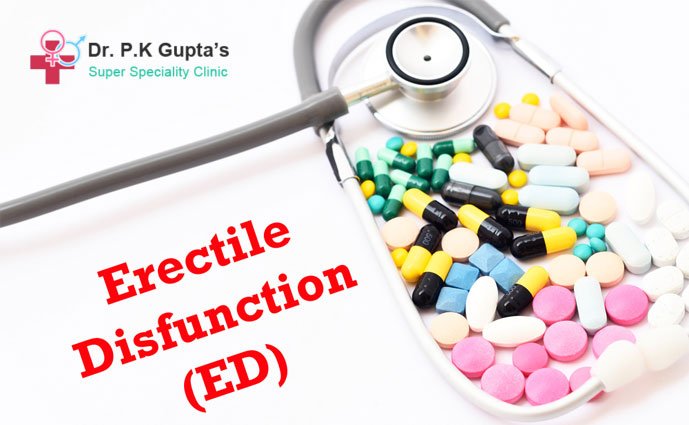
Erectile dysfunction (ED) is a condition that affects a significant number of men, particularly as they age. It is characterized by the inability to achieve or maintain an erection sufficient for satisfactory sexual performance. While it may be embarrassing to discuss, understanding ED is crucial for those affected and their partners. This blog post will delve into the causes, symptoms, and various treatment options available for erectile dysfunction.
The Prevalence of Erectile Dysfunction
ED is more common than many might assume. According to studies, approximately 30 million men in the United States experience some degree of erectile dysfunction. The prevalence increases with age, affecting about 40% of men at age 40 and nearly 70% of men by age 70. However, it is essential to note that ED can affect men of all ages, often stemming from physical or psychological issues.
Causes of Erectile Dysfunction
Understanding the underlying causes of erectile dysfunction is vital for effective treatment. Causes can be broadly categorized into physical and psychological factors:
- Physical Causes:
- Cardiovascular Diseases: Conditions affecting blood flow, such as atherosclerosis (hardening of the arteries), are significant contributors to ED.
- Diabetes: High blood sugar levels can damage blood vessels and nerves, making it difficult to achieve an erection.
- Hormonal Imbalances: Low testosterone levels can lead to diminished libido and erectile dysfunction.
- Neurological Disorders: Conditions like Parkinson’s disease and multiple sclerosis can interfere with nerve signals necessary for erection.
- Medication Side Effects: Certain medications, especially those for depression, anxiety, and hypertension, can contribute to ED.
- Psychological Causes:
- Stress and Anxiety: Mental health plays a significant role in sexual performance. Stress about sexual performance or relationships can exacerbate ED.
- Depression: Men experiencing depression may lose interest in sex altogether.
- Relationship Issues: Problems within a relationship can lead to emotional disconnect and contribute to erectile dysfunction.
Symptoms of Erectile Dysfunction
The primary symptom of erectile dysfunction is the inability to achieve or maintain an erection during sexual activities. Other symptoms can include reduced sexual desire and a lack of enjoyment in sexual activities. It’s essential for individuals experiencing these symptoms to consult with a healthcare provider for an accurate diagnosis and appropriate treatment.
Diagnosis of Erectile Dysfunctions
To diagnose erectile dysfunction, healthcare providers typically conduct a thorough medical history and physical examination. They may also recommend tests to rule out underlying medical conditions. These tests can include blood tests to check hormone levels, blood sugar, and cholesterol levels, as well as assessments of nerve function and blood flow.
Treatment Options for Erectile Dysfunction
The treatment for erectile dysfunction depends on the underlying cause. Options include:
- Lifestyle Changes:
- Exercise: Regular physical activity can improve blood flow and overall health, reducing symptoms of ED.
- Diet: A healthy diet rich in fruits, vegetables, whole grains, and lean proteins can benefit sexual health.
- Weight Management: Maintaining a healthy weight can reduce the risk of diseases associated with ED.
- Medications:
- Phosphodiesterase Type 5 Inhibitors (PDE5 inhibitors): These oral medications, such as Viagra (sildenafil), Cialis (tadalafil), and Levitra (vardenafil), enhance blood flow to the penis, making it easier to achieve an erection when sexually stimulated.
- Hormone Therapy: If hormonal imbalances are identified, testosterone replacement therapy may be considered.
- Psychological Counseling: For men with psychological causes of ED, therapy can be beneficial. This may include cognitive behavioral therapy (CBT) to address anxiety or depression and improve sexual function.
- Medical Devices:
- Vacuum Erection Devices (VEDs): These devices create a vacuum around the penis to encourage blood flow, resulting in an erection.
- Penile Implants: In cases where other treatments are ineffective, surgical options, such as penile implants, can provide a permanent solution.
- Alternative Therapies: Some men explore alternative treatments, such as acupuncture or herbal supplements. However, it’s essential to consult a healthcare provider before trying these methods, as they may not be scientifically validated.
Living with Erectile Dysfunction
Erectile dysfunction can significantly impact a man’s quality of life and relationships. Open communication with partners about the condition is essential, as it can alleviate feelings of shame or inadequacy. Many men find that involving their partners in discussions about treatment options can enhance intimacy and understanding.
Support groups and therapy can also be beneficial for men struggling with the emotional aspects of ED. Learning from others who face similar challenges can provide comfort and practical advice.
Struggling with erectile dysfunction? You’re not alone. Our expert sexologist in Delhi offers personalized consultations and effective treatment options tailored to your needs. Don’t let ED affect your confidence and relationships—take the first step towards a fulfilling sex life. Contact us today for a discreet and compassionate approach to reclaiming your sexual health!
Conclusion: Seeking Professional Help
Erectile dysfunction is a common condition that can arise from various physical and psychological causes. Fortunately, numerous effective treatments are available. If you or someone you know is experiencing symptoms of ED, seeking the help of a healthcare professional is crucial. A sexologist in Delhi can provide specialized care and tailored treatment options to help manage erectile dysfunction and improve sexual health. Don’t hesitate to reach out and take the first step toward a fulfilling sex life.